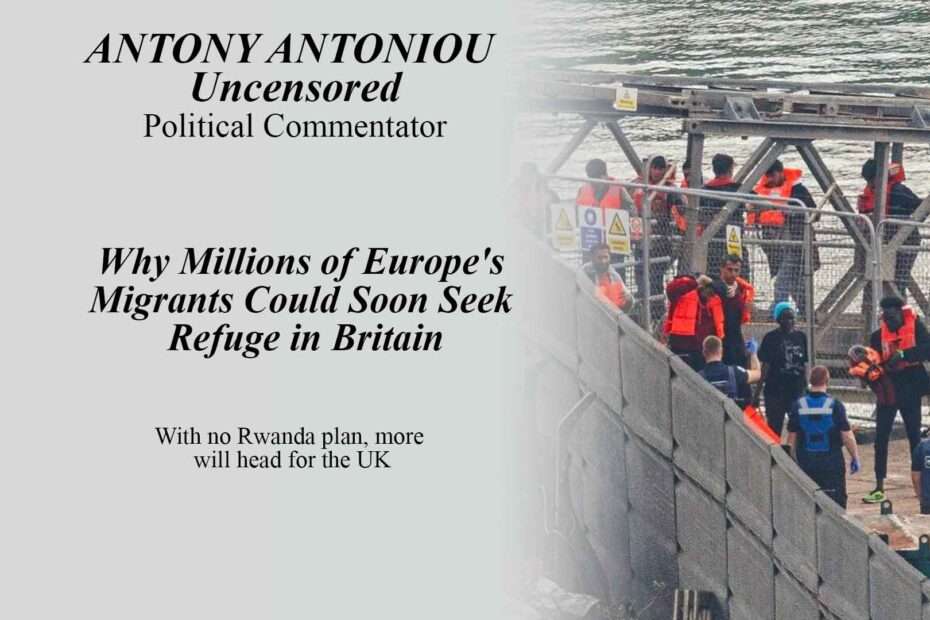Why Millions of Europe’s Migrants Could Soon Seek Refuge in Britain
European Union’s Shifting Stance on Offshore Processing Signals Major Policy Change
The European Union’s approach to managing asylum seekers is undergoing a dramatic transformation, with potential far-reaching consequences for the United Kingdom. As Ursula von der Leyen, President of the European Commission, charts a new course, Britain may need to reassess its own immigration policies in light of continental developments.
The Albanian Precedent
In a groundbreaking development, Italy has pioneered what could become a blueprint for European asylum processing. On 14 October, an Italian naval vessel departed from the Mediterranean island of Lampedusa, bound for the Albanian port of Shen Gijn. Its cargo: 16 asylum seekers, comprising ten Bangladeshi and six Egyptian nationals, all of whom had been rescued by Italian naval forces near the Libyan coastline.
This innovative arrangement with Albania represents a significant departure from traditional asylum processing methods. Under the terms of the agreement, Italy maintains the authority to transfer certain categories of asylum seekers to Albanian territory for processing. However, the scheme incorporates careful restrictions: only adult male applicants from countries deemed safe and who are not classified as vulnerable may be redirected to Albania. Women, children, and individuals with health concerns will continue to have their cases processed within Italy’s borders.
The Complex Challenge of Returns
The necessity for such measures becomes apparent when examining the current state of asylum seeker returns across Europe. According to Eurostat’s revealing figures, a mere 20 per cent of failed asylum seekers are successfully deported from EU territory. This startling statistic illuminates the systemic challenges facing European nations in enforcing their immigration policies.
The ramifications of this ineffective return system are far-reaching and occasionally tragic. Consider the case of Lawangeen Abdulrahimzai, whose rejected asylum claim in Norway did not result in his deportation to Afghanistan. His subsequent illegal entry into Britain culminated in the murder of Thomas Roberts, an aspiring Royal Marine, in Bournemouth in 2022. This case starkly illustrates the potential consequences of inadequate enforcement mechanisms.
Germany’s Mounting Challenges
The situation in Germany, von der Leyen’s home nation, provides a compelling example of the pressures facing European asylum systems. Despite targeting a three-month processing window for asylum claims, the average processing time has ballooned to 18.7 months. This delay partly stems from an enduring backlog dating to 2015-16, when Chancellor Angela Merkel’s open-border policy led to an unprecedented influx of arrivals.
The scale of the challenge is reflected in the numbers: Germany has witnessed an astronomical rise in asylum seekers and refugees, from 613,000 in 2013 to 3.1 million in recent years. This surge has imposed a substantial burden on German taxpayers, while simultaneously straining the country’s administrative and social infrastructure.
Particularly concerning is the reduction in Germany’s deportation capacity. The number of beds in deportation facilities has dwindled to just 790, severely limiting the country’s ability to manage failed asylum cases effectively. This constraint has had serious implications, as evidenced by the tragic incident in Solingen, where an Islamist attacker whose asylum claim had been rejected, but who had not been deported, committed a deadly knife attack.
The European Response
The EU’s existing framework for managing returns, established through the migrant return directive of 2008, has proved inadequate for current challenges. A coalition of Schengen nations, spearheaded by Austria and the Netherlands, has recently pressed for modernisation of these procedures through an informal “non-paper” submitted to the European Commission.
Von der Leyen’s acknowledgement of the need for external processing centres marks a significant shift in EU policy thinking. However, this approach still faces considerable hurdles, particularly from the European legal framework. The European Court of Justice continues to issue rulings that complicate return procedures, as evidenced by its recent decision regarding Afghan women.
Implications for British Policy
The contrast between the EU’s evolving approach and Britain’s position is becoming increasingly stark. While the Italian-Albanian model represents a measured step towards offshore processing, it remains considerably less comprehensive than Britain’s now-abandoned Rwanda scheme, which proposed relocating all illegal entrants to the African nation.
As European nations move towards more robust offshore processing arrangements, the Labour Party’s position on the Rwanda plan may require reassessment. The maintenance of costly hotel accommodation for asylum seekers, coupled with continuing illegal arrivals, suggests that Britain might benefit from aligning more closely with emerging European practices.
Looking Ahead
The development of external processing centres represents a significant evolution in European asylum policy. However, it may still fall short of addressing public concerns about immigration control. While European leaders frequently pledge to implement stricter measures – exemplified by Polish Prime Minister Tusk’s recent proposal to prevent asylum claims altogether – translating these promises into effective policy remains challenging.
As pressure mounts across Europe for more effective asylum processing solutions, Britain faces a crucial decision point. The possibility of increased migration flows towards the UK, particularly if continental Europe strengthens its procedures, demands careful consideration of available policy options. The coming months and years may well determine whether Britain can develop an asylum system that balances humanitarian obligations with effective border control, while remaining responsive to evolving European approaches.

